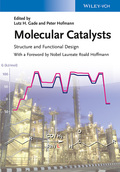Molecular Catalysts
Structure and Functional Design

1. Auflage Juli 2014
528 Seiten, Hardcover
170 Abbildungen (20 Farbabbildungen)
Handbuch/Nachschlagewerk
Kurzbeschreibung
Highlighting the key aspects and latest advances in this rapidly developing field, this essential reference covers new strategies to investigate reaction mechanism, catalyst optimization, and the rational design of well-defined, molecular catalysts.
Jetzt kaufen
Preis: 182,00 €
Preis inkl. MwSt, zzgl. Versand
Euro-Preise für Wiley-VCH- und Ernst & Sohn-Titel sind nur für Deutschland gültig. In EU-Ländern gilt die lokale Mehrwertsteuer. Portokosten werden berechnet.
Highlighting the key aspects and latest advances in the rapidly developing field of molecular catalysis, this book covers new strategies to investigate reaction mechanisms, the enhancement of the catalysts' selectivity and efficiency, as well as the rational design of well-defined molecular catalysts. The interdisciplinary author team with an excellent reputation within the community discusses experimental and theoretical studies, along with examples of improved catalysts, and their application in organic synthesis, biocatalysis, and supported organometallic catalysis. As a result, readers will gain a deeper understanding of the catalytic transformations, allowing them to adapt the knowledge to their own investigations.
With its ideal combination of fundamental and applied research, this is an essential reference for researchers and graduate students both in academic institutions and in the chemical industry.
With a foreword by Nobel laureate Roald Hoffmann.
Introduction
MECHANISMS OF ELEMENTARY REACTIONS IN CATALYTIC PROCESSES
Quantum Dynamics of Molecular Elementary Processes in Catalytic Transformations
Activation of Small Molecules with Metal and Metal Oxide Clusters in Inert Gas Matrices
Towards Single-Molecule Catalysis
Intermediates and Elementary Reactions in Gold Catalysis
Diastereoselectivity in Alkene Metathesis
NEW CATALYSTS - NEW AND OLD REACTIONS
Oxidation Catalysis with High-Valent Nonheme Iron Complexes
Single-Site Organochromium Catalysts for High Molecular Weight Polyolefins
Ligand Design and Mechanistic Studies for Ni-Catalyzed Hydrocyanation and 2-Methyl-3-Butenenitrile Isomerization Based upon Rh-Hydroformylation Research
Strongly Electron Donating Tridentate N-Heterocyclic Biscarbene Ligands for Rhodium and Iridium Catalysis
NHCP Ligands for Catalysis
CATALYSTS IN SYNTHESIS
Ir-Catalyzed Asymmetric Allylic Substitution Reactions - Fundamentals and Applications in Natural Products Synthesis
Sequential Catalysis Involving Metal Catalyzed Cycloisomerizations and Cyclizations
C-N-Coupling Reactions in Catalytic One-Pot Syntheses using Molecular Group 4 Catalysts
Sequential Catalysis for the Stereoselective Synthesis of Complex Polyketides
Modular Assembly of Chiral Catalysts with Polydentate Stereodirecting Ligands
STRUCTURES AND MECHANISMS IN BIOLOGICAL SYSTEMS
Beating and Employing X-Ray-Induced Radiation Damage in Structural Studies of Hemoproteins
The Catalytic Strategy of P-O Bond Cleaving Enzymes: Comparing EcoRV and Myosin
Selective Hybrid Catalysts Based on Nucleic Acids
STUDIES OF IMMOBILIZED CATALYSTS
Dendrimers as Platforms for Stereoselective Catalysis
Solid Phases as Protective Environments for Biomimetic Catalysts
High-Throughput Screening of Catalysts and Reactions
Index
Peter Hofmann holds a chair and is a director of the Institute of Organic Chemistry at the University of Heidelberg (Germany) since 1995. He is the scientific director of CaRLa, the joint Catalysis Research Laboratory of the University of Heidelberg and BASF SE. He obtained a diploma in chemistry in 1970 and a PhD from the University of Erlangen-Nuremberg (Germany) in 1973. After post-doctoral studies with Roald Hoffmann at Cornell University (USA), he completed his habilitation with Paul v. Ragué Schleyer in Erlangen, where he - after a visiting associate professorship at Berkeley in 1979 - became associate professor in 1980. From 1981 until 1983 he held E. O. Fischer's guest chair at the Technical University Munich (Germany) where he was appointed associate professor of Inorganic Chemistry in 1983. He is a recipient of the Emil Fischer medal of the German Chemical Society, a member of the Heidelberg Academy of Sciences and of the North Rhine-Westphalian Academy of Sciences, Humanities and Arts. He initiated the collaborative research centre (SFB 623) on molecular catalysts and was its chairman (2002 to 2009).


